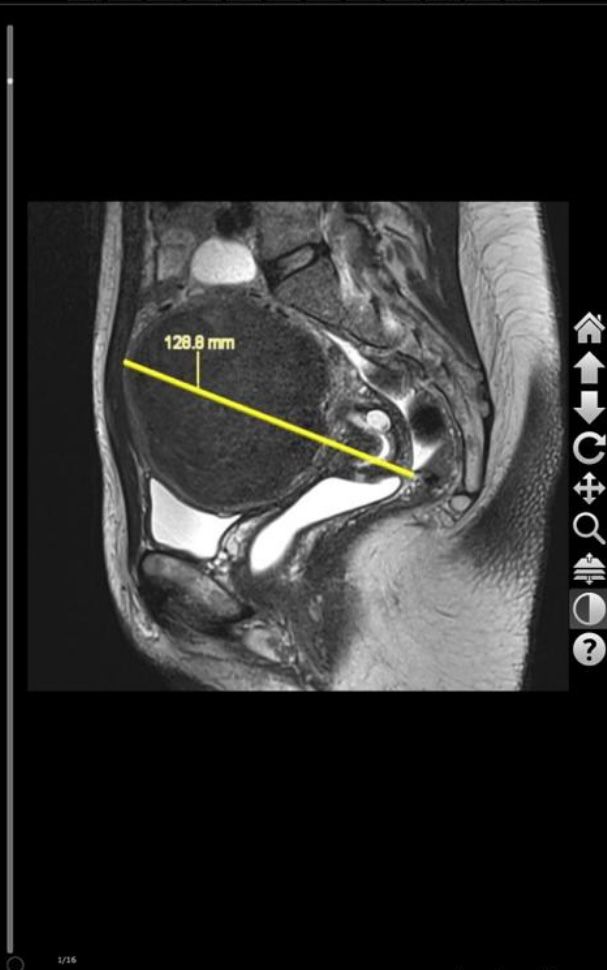Not all fibroids require treatment, but they should all be observed carefully.
The management of a uterine fibroid varies according to its location, size and symptoms as well as the patient’s age, desire for pregnancy, history and associated pathologies.
A pelvic or vaginal ultrasound is the first diagnostic test.
This examination makes it possible to explore the organs and tissues of the pelvic cavity formed by the bladder, the uterus and its cervix, the ovaries, the fallopian tubes, the serous wall, the mucous wall, the endometrium…
A pelvic ultrasound is used to locate the fibroid (s). Following the ultrasound, a report is sent to the gynecologist or doctor who will then discuss with the patient the most suitable therapeutic strategy for her case.
To perform a pelvic ultrasound, the patient must have a full bladder. To do this, it is recommended that she drink about a liter of clear fluid an hour before the exam (and not urinate) so that the bladder fills.

Questions to ask during the medical consultation.
Following confirmation of the presence of uterine fibroids, it is suggested to ask a series of questions to your family doctor, gynecologist or specialist before starting any treatment.
- Why do I have uterine fibroids?
- How many fibroids do I have?
- Where are they located?
- How much do they measure?
- Should they be treated?
- What are the proposed drugs on the market?
- What are the benefits and risks of each treatment option?
- What are the side effects of these drugs?
- Is there a risk to my fertility?
- Will my sex life be affected? My libido ?
- What is an artificial menopause?
- Are there other alternatives?
- What is the difference between a myomectomy and a hysterectomy?
- What are the preoperative procedures?
- What will be the length of my stay?
- Will I be under total or partial anesthesia? (infection? transfusion? urinary catheter?)
- What types of care will I need after treatment?
- How should I prepare for my return home when I get out of the hospital?
- How long will it take me to resume my normal activities and return to work?
- When can I resume sexual activity?
- How long do I have to wait to get pregnant?
- Can I be operated for fibroids while pregnant?
- Can my miscarriage be linked to fibroids?
- Can I receive treatment while pregnant?
- Does the presence of fibroids pose a risk to the baby?
- Should special monitoring be scheduled during pregnancy?
- Why do fibroids increase in size when you are pregnant? What is the risk?
How to get an appointment at the Uterine Fibroids Clinic
The OVO Fertility Clinic and the Vivre 100 Fibromes association have collaborated to establish a uterine fibroid clinic offering medical consultations to women with uterine fibroids. To qualify for an appointment with the gynecologist, you must have been diagnosed with uterine fibroid (s) and have one of the following symptoms:
- Presence of heavy and/or prolonged menstrual bleeding
- Urinary incontinence and/or constipation
- Abdominal heaviness and/or feeling of pressure
You will generally be given an appointment within 2 months.
People insured by the Quebec health insurance plan who present their health insurance card do not have to pay for this service.
Do you want to make an appointment? Please complete the consultation request form.
Since December 2019, a uterine fibroids clinic exists at the University of Montreal Hospital Center (CHUM), department of reproductive medicine and biology – fertility clinic.
Women with fibroids who want to preserve their fertility can send a consultation request to the fax machine at the drop-off point:
514-412-7000
The Department of Reproductive Medicine and Biology will contact you for an appointment.

A multidisciplinary consultation to maintain the health of your uterus.
The information on this page is provided to you for informational purposes. In no case do they replace the advice of your healthcare professional.


